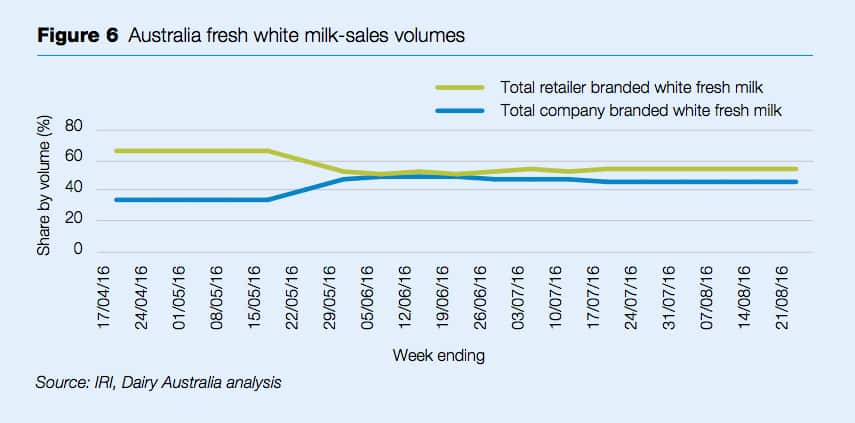The dollar per litre supermarket war has turned milk into the staggering exception on Australians’ supermarket dockets.
As inflation drives up the price of other food and drink, the gap in cost between milk and other products in the grocery basket has grown, according to CPI data released by the Australian Bureau of Statistics.
And it’s having a profound effect on the dairy industry, in some cases sending dairy cows to slaughter so they can be used for cheap beef.
Since Coles introduced its dollar milk at the start of 2011, milk - at a decrease of 13 per cent - is the only grocery item that has dropped by more than a tenth of its value in 2010, according to the country's official inflation figures.
Overall inflation for this period has been the opposite: an increase of 13 per cent. The price of beef and veal has increased even more, to 24 per cent.
The Senate is holding a public hearing for its dairy industry inquiry today.
In calling for the inquiry, Senators Jacqui Lambie and Nick Xenophon noted that the price of bottled milk per litre is now often less than the cost of bottled water.
Dr Daniel Terrill from Deloitte Access Economics said higher beef prices are prompting some dairy farmers to pursue the beef market.
“The dairy herd is getting smaller as the beef herd is getting bigger,” he said.
“(The shift) is not just switching land use, but sometimes switching the purpose of the cattle themselves - where dairy cattle are getting sold as low value beef."
But a growing awareness around the challenges faced by dairy farmers appears to be driving Australians to overlook cheaper supermarket brand milk in favour of company branded products.
Industry body Dairy Australia believes one prime-time, pro-farmer monologue from TV personality Waleed Aly in May may have been the trigger for Australians' radical shift toward company branded milk.

A shift towards company-branded milk in May was attributed by Dairy Australia to a campaign in support of dairy farmers, including an address from Waleed Aly. Source: Dairy Australia
An industry divided
Acting Australian Dairy Farmers President, David Bash, said dollar milk was unsustainable and does not give a fair return to dairy farmers and others in the supply chain.
"Farmers want to work co-operatively with the supply chain, there is no place for bullying – we must all work together to achieve the best outcome for the consumers we all serve,” he told SBS.
However a submission to the inquiry from the Murray Goulburn Co-operative, which collects, processes and sells more than one-third of the milk Australia produces, argues “there is no link between Coles’ shelf price and the price paid to MG farmers under our contract".
In 2014, Murray Goulburn secured a 10-year contract with Coles to supply dollar milk, and Woolworths has a similar arrangement with the Fonterra dairy company.
Senator Lambie told SBS that dollar milk was still an issue and criticised the damage to the dairy industry caused by these long-term deals.
“When you introduce dollar milk, and you put 10 years on it - what idiot executive would do that?” she said.
The industry is vulnerable to the international dairy market, in which local producers compete against providers in other countries receiving subsidies from their governments.
Of all the milk produced in Australia, only one quarter is used for "drinking milk", according to Dairy Australia. The rest is cheese, butter and other dairy products. Approximately 40 per cent of dairy products are exported.
Both Murray Goulburn and Coles are providing additional loans or grants schemes for farmers.
"Dairy cattle are getting sold as low value beef."
Murray Goulburn's Annual General Meeting is scheduled for Friday. The group is facing a class action by shareholders for allegedly misleading investors over its level of profitability when it floated on the share market in 2015.
The Senate is due to report by February next year.
A separate inquiry, initiated by Deputy Prime Minister Barnaby Joyce, was announced in August to be undertaken by the Australian Competition and Consumer Commission.
Share

